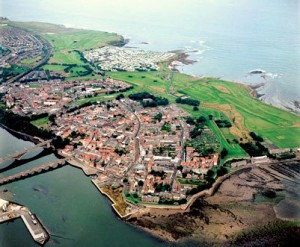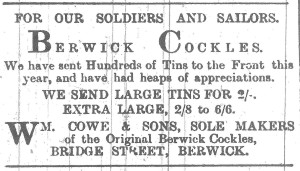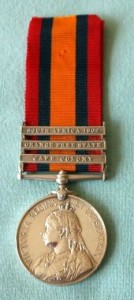
ARMISTICE DAY CELEBRATIONS
At the Armistice Day celebration at the British School, Palace Green, today (Thursday), the Rev. W. Jardine delivered an address after the two minutes’ silence at 11a.m. The hymn “O God, our help in ages past” was sung, and then Mr H. W. Willits unveiled the War Memorial to the fallen scholars. Mr Jardine offered prayer, and the proceedings closed with the “National Anthem.”
There was a short service at Berwick Parish Church today (Thursday), commencing at 10.45. The two minutes’ silence was observed, and prior and after that period appropriate psalms, lessons, and prayers were recited, the Vicar conducting the service.

At the barracks the troops paraded, the “Last Post” being sounded at 11a.m. and Reveille at the expiry of the two minutes.
At 11 o’clock today (Thursday) the Commandant of the Berwick branch of the Comrades of the Great War laid a laurel wreath at the foot of the Tweedmouth War Memorial. The wreath bore the inscription, “In loving memory of those whose names are seen here and their unknown comrades, this wreath is laid by the Comrades of the Great War.”
THE NEW SHERIFF
Mr Robert Carr, of The Elms, Berwick, who was unanimously elected Sheriff of the Borough of Berwick, is one well fitted to hold the office. For such an ancient and honourable position, it is very appropriate that a gentleman who has dabbled in the historical records and folklore of the Border as Mr Carr has done should be selected. It is certain he will fill the office with credit to himself and to the town.

To agriculturists in North Northumberland and Berwickshire, the name Robert Carr, of Grindon, is as familiar as the Corn Exchange on market day. Grindon, apart from Mr Carr and he from Grindon, would have been an unthinkable thing some few years ago, but it came to pass nevertheless, and he now lives the life – to him the rather slow and tiresome life- of a retired gentleman. While in Grindon, Mr Carr became known around the district as one who knew how to produce the most from his land, and who took second place to none as a successful agriculturist. He was a keen student of the various problems arising in the industry, and his advice and word carried weight with others. He was one of the most prominent members of the Berwick and Borders Farmers’ Association, now merged in the N.F.U., and there he took a leading part in the business coming before the Association from time to time. He is still associated with Norham and Islandshires Ploughing and Hedge Cutting Society, which was promoted to stimulate interest in successful tillage and farm cleanliness amongst farm workers and masters alike.
LOCAL NEWS
At the Kennel Club’s Championship Show at Crystal Palace, London, on November 3rd and 4th, Mr David Black, Berwick, won 1st prize Puppy, 3rd prize Limit, and 3rd prize Open Classes, with his sensational winning puppy, Tweedside Red Hot. His well known stud dog, Tweedside Red Squire, was also entered, but failed to do his weight, having lost 4½ lbs. on the journey down, so did not compete in either of his classes.
Wallace Green Literary Society, at their meeting on Monday evening, were invited to discuss various topics, suggested by contributions to the “Berwick Times.” The Editor, Mr W. Paterson, read the various articles, eight in number, and lively discussions followed each one. The first contribution was a poem entitled “Our Literary Society,” and dealt in humorous fashion with the “awful silence” that invariably fails upon the audience, when, after a paper, the chairman throws the meetings open to discussion. Then followed an interesting article entitled “Ought we to criticise the way other people spend their money?” by “Evangeline.” This provoked a good deal of discussion. A third article was in the nature of a plea for Wallace Green Church Library, founded in Golden Square Church in Dr Balmer’s days, when it was the only circulating library in the town. Now the membership has sunk to “three or four devoted souls,” but hopes were expressed that, the volumes having been put in order and the catalogue brought up to date, there would soon be a lengthy queue outside the Session House on a Thursday evening. “Diogenes” gave an amusing criticism on the meetings already held by the Society this session. “II Penseroso” treated with the slang phrase “ I don’t think,” arguing that it contained more than a germ of truth – that a great proportion of the men and women of today do not think, but accept the opinions of other people as their own. “A Sufferer” wrote of the behaviour of people in the street and the general neglect of the rule “keep to the right.” A strong condemnation of the delay in bringing the ex-Kaiser to justice, contributed by “Nemisis.” wound-up the evening. The eighth paper, in the form of a short letter was not read.
THE NEW RAILWAY BRIDGE
The deputation from the Town Council when it goes to Edinburgh to see the General Manager of the N.B.R. about the stairway to the Railway Bridge will have the solid backing of the inhabitants in the northern part of the town.

At the moment, when alterations are in progress, people are willing to put up with the absence of the stairway, but they could not be expected to do without it permanently. It will, however, be a great convenience to have the reconstructed stairway lead to the platform for the south trains. Under the old conditions, whether you were going north or south, you had to cross the bridge to get a ticket. If the stairway is placed as we suggest, only half of the passengers will need to cross the bridge.
INQUEST ON BERWICK CHILD
Coroner H. R. Peters, without calling a jury, on Friday night conducted an inquest in his office touching the death of Annie Bolton, the four month old child of Allison Bolton, single woman, Driver’s Lane, whose death occurred rather suddenly in the early hours of Thursday morning, 4th November.
Allison Bolton, the mother, identified the body as that of her child. The child had been suffering from a cold for two or three days, but she did not think there was anything seriously wrong with it. It had been taking its food regularly. At eight o’clock on Wednesday night she fed the child and put it into bed. Apart from the cold it was then all right. Witness went to bed shortly after, and at 1 am on Thursday was awakened by the child coughing and having difficulty with its breathing. She at once went for Dr P. W. Maclagan, leaving the child in her mother’s charge. On returning the child was dead.
Dr P. W. Maclagan said he was called by the last witness at 1.30 am on Thursday morning, and proceeded to the house in Driver’s Lane. On arriving there the child was found to be dead. It had only been dead a short time. He enquired about its illness, and was told it had been suffering from a cold, but had only become seriously ill at one o’clock. On Friday, along with Dr Caverhill, he conducted a post mortem at the mortuary, where he found that death had resulted from an attack of acute double pneumonia. The child was well nourished. Witness had attended the birth of the child, and at that time difficulty was experienced in getting the child to breathe. Otherwise the child was all right and healthy. In a child of that age the symptoms of double pneumonia would not be very marked prior to the fatal illness. The pneumonia would develop suddenly.
The Coroner returned a verdict in accordance with the medical evidence.




